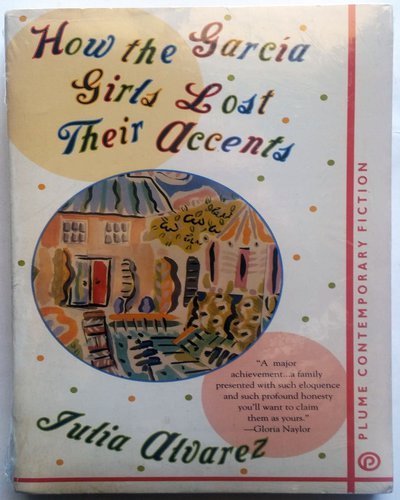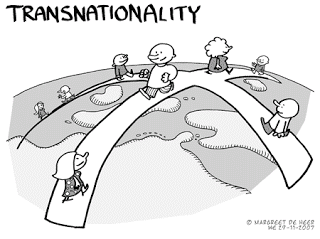Winning in Loosing: Julia Alvarez’s How the Garcia Girls Lost Their Accents.
Winning in Loosing: Julia Alvarez’s How the Garcia Girls Lost Their Accents.

Hi, Steemians. Continuing with my commentaries on Diaspora and post-colonial topics, I would like to talk this time about a novel by Dominican-American author, Julia Alvarez. A member of the DR Diaspora, who utilizes poetry, essays and fiction as tools to discuss issues of immigration, discrimination and international politics, especially regarding the USA involvement in Latin-America and the Caribbean. The issues are more current than ever, especially in the context of new waves of migration around the world that have put interventionism, racism, discrimination and stereotyping back on the table. When millions of my fellow Venezuelans are leaving the country and are already experiencing the anxieties of the exiles (losing their accent being one of them), this beautiful novel has especial resonance for me. Read why…
How the Garcia Girls Lost their Accents is a story of immigrants from the Dominican Republic who come to the United States fleeing from the bloody regime of Gen. Rafael Leonidas Tujillo (1930-1961). Julia Alvarez introduces the Garcia girls (Carla, Sandra, Yolanda, and Sofia) through a reversed narration that, far from being a simple backwards account of the different stages of her characters’ migratory and socio-political dilemma, leads the reader to a more complex polyphonic narration that explores not only the geopolitical implications of transnationality but also the moral and psychological conflicts of identity, thus contesting commonly held assumptions about foreignness and citizenship.

Although the narration goes progressively back in time there is a textual dialogue between present and past at the end, so that through the interconnections of the different narrative spaces Alvarez tries to explain the present multicultural/transnational situation of the Garcia family emphasizing the language and cultural background as conditioning factors in the definition of their identity.
Transnationality, for Alvarez, appears to be determined by language. The passing of the physical borders of nationhood appears to be conditioned to the capacity to perform emotionally in the language left behind once the newly acquired one has somehow imposed its patterns, values and customs. Similarly, the state of “strangerhood,” is not determined by a political entity or group but by the Garcias themselves. Their conflicts of identity put them in a liminal space where they may belong to both Latino and American (USA) cultures, but risk getting tangled up under the barbwire of race, religion and language.

It is, then, space rather than territory what Alvarez’s transnationals inhabit. Obviously there is a difference between inhabiting these spaces and being accepted inside them. Ultimately, that process of acceptance or rejection (assimilation/exclusion) and its socio-political implications become the main concern of the transnational text.
The novel splits in “chapters” within sections chronologically framed but vaguely determined. These interconnected, yet independent recounts, allow for different voices and views. Although the girls are united by the same biological and experiential links, their voices emerge as differentiated tones beyond the mere clothes-color-system Laura, the mother, tried to impose to her Cuquitas. The continual efforts of the parents to homogenize the girls (comparable with the nation/state relation in determining citizenship) might have complicated the girls’ ability to self-differentiate and find the boundaries of their personalities, but each one eventually developed her own voice, although that individualization resulted at times in exclusion (Sofia).

The novel implies, thus, searching, passing, erasing, and losing. According to Trinh Minh-ha, “to seek is to lose, for seeking presupposes a separation between the seeker and the sought, the continuing me and the changes it undergoes.” Alvarez appears to question the either/or binary faced by the immigrants (which makes them crave to be assimilated to the new culture) and the political neither/nor assumption once transnationalism has been “achieved” (which makes them question their identity).
The Garcias are willing to learn to fit in the “Unitedstatian” culture, but, as Bauman puts it, “forgetting, rather than learning is the condition of continuous fitness.” When the Garcia girls (proudly) lose their accent, they are also losing part of their identity; this realization would gradually come with the eventual comebacks to the Dominican Republic. When Yolanda faces the two “strangers” in her search for sweetly remembered guavas, she is unable to communicate in Spanish, “her tongue feels as if it has been stuffed in her mouth like a rag to keep her quiet” (Alvarez 19-20). Admitting her fear, she admits her own “strangerhood,” her mother tongue becomes something alien to her.

However, the Garcias do not forget completely, they are constantly haunted by fragmented memories of what Alvarez suggests might perfectly be overlapping worlds; worlds that, although opposed, offer valuable cultural elements that could be welcomed in a both/and, rather than either/or basis. Alvarez’s characters build their transnational identity on the relationship of their narrative spaces, on the barrier-free language of memories, on their acceptance of their “strangerhood” as part of their citizenship, on the understanding of others’ differences; aspects that go beyond the mere geographical and socio-political delimitations. Their success in the United States (examples here) is not despite of their Latino background but because of their capacity to incorporate their mother language and culture to the new one, thus becoming fuller citizens, fully linguistically, culturally and emotionally bilingual.
Thanks for the visit and the support
Works Cited or Consulted
Alvarez, Julia. How the Garcia Girls Lost their Accents. New York: Plume, 1992.
Bauman, Zygmunt. “The Making and Unmaking of Strangers.” Printed in Multi-Cultural
Identities and the Politics of Anti-Racism. London: Zeol Books, 1997.
Minh-ha, Trinh. “Not You/Like You: Postcolonial Women and the Interlocking Questions of
Identity and Difference.” The Longman Anthology of Women Literature. Mary
Deshazeck, Ed.
Great work. Once again I 'll tell you that I'd like to read this novel.
Thanks for the visit. I can offer you the Spanish version :)
I lost my English copy.
I'm taking this concept for further analysis: "being emotionally bilingual." Thanks for such complete commentary, @hlezama.
Thanks you for the support.
Yep, bilingualism has its bemoles; the affective aspect of acculturation is probably the hardest one to get.